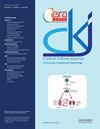睡眠时间与慢性肾病风险的关系:系统回顾与元分析
IF 3.9
2区 医学
Q1 UROLOGY & NEPHROLOGY
引用次数: 0
摘要
背景与假设 已发表的文献表明,慢性肾脏病成人患者的睡眠时间和质量可能会受到影响。然而,这两者之间的关系仍存在争议。本系统综述和荟萃分析旨在评估睡眠时间和质量对慢性肾脏病的影响。方法 对 Medline/PubMed、Embase、Cochrane Library 和 CINAHL 数据库中与睡眠时间和质量对慢性肾病的影响有关的文章进行了系统回顾。主要结果是不同睡眠时间和质量的患者患慢性肾病的危险/风险比。结果 42 项研究(2 613 971 名患者)被纳入荟萃分析,平均年龄为 43.55 ± 14.01 岁。与 7 至 8 小时睡眠的参考范围相比,睡眠时间≤ 4 小时(RR 1.41,95% CI:1.16 至 1.71,p< 0.01)、≤5 小时(RR 1.46,95% CI:1.22 至 1.76,p< 0.01)、≤6 小时(RR 1.18,95% CI:1.09 至 1.29,p &p;lt;0.01)和≤7 小时(RR 1.19,95% CI:1.12 至 1.28,p &p;lt;0.01)与慢性肾脏病发病风险增加显著相关。睡眠时间长于≥8小时(RR 1.15,95% CI:1.03 至 1.28,pamp &;lt;0.01)和≥9小时(RR 1.46,95% CI:1.28 至 1.68,pamp &;lt;0.01)也与慢性肾脏病发病风险的增加显著相关。元回归没有发现年龄、性别、地理区域和体重指数对睡眠时间与慢性肾脏病发病风险的相关性有明显影响。结论 睡眠时间长短与罹患慢性肾脏病的风险高低有明显关系。为达到最佳睡眠时间而采取的干预措施可降低慢性肾脏病的发病风险。本文章由计算机程序翻译,如有差异,请以英文原文为准。
The Association of Sleep Duration with the Risk of Chronic Kidney Disease: a Systematic Review and Meta-Analysis
Background and hypothesis Published literature suggests that sleep duration and quality may be affected in adults with chronic kidney disease. However, the relationship between these two entities remains a matter of debate. The objective of this systematic review and meta-analysis is to assess the effect of sleep duration and quality on chronic kidney disease. Methods A systematic review of the Medline/PubMed, Embase, Cochrane Library and CINAHL databases was conducted for articles pertaining to the association between sleep duration and quality on chronic kidney disease. The main outcome was the hazard/risk ratio of chronic kidney disease in patients of varying sleep durations and quality. Results 42 studies (2 613 971 patients) with a mean age of 43.55 ± 14.01 years were included in the meta-analysis. Compared with a reference range of 7 to 8 hours of sleep, short sleep duration of ≤ 4 hours (RR 1.41, 95% CI: 1.16 to 1.71, p < 0.01), ≤5 hours (RR 1.46, 95% CI: 1.22 to 1.76, p < 0.01), ≤6 hours (RR 1.18, 95% CI: 1.09 to 1.29, p < 0.01) and ≤ 7 hours (RR 1.19, 95% CI: 1.12 to 1.28, p < 0.01) were significantly associated with an increased risk of incident chronic kidney disease. Long sleep duration of ≥ 8 hours (RR 1.15, 95% CI: 1.03 to 1.28, p < 0.01) and ≥ 9 hours (RR 1.46, 95% CI: 1.28 to 1.68, p < 0.01) were also significantly associated with an increased risk of incident chronic kidney disease. Meta-regression did not find any significant effect of age, gender, geographical region and BMI and the association of sleep duration and risk of incident chronic kidney disease. Conclusion Both short and long sleep duration were significantly associated with a higher risk of chronic kidney disease. Interventions targeted towards achieving an optimal duration of sleep may reduce the risk of incident chronic kidney disease.
求助全文
通过发布文献求助,成功后即可免费获取论文全文。
去求助
来源期刊

Clinical Kidney Journal
Medicine-Transplantation
CiteScore
6.70
自引率
10.90%
发文量
242
审稿时长
8 weeks
期刊介绍:
About the Journal
Clinical Kidney Journal: Clinical and Translational Nephrology (ckj), an official journal of the ERA-EDTA (European Renal Association-European Dialysis and Transplant Association), is a fully open access, online only journal publishing bimonthly. The journal is an essential educational and training resource integrating clinical, translational and educational research into clinical practice. ckj aims to contribute to a translational research culture among nephrologists and kidney pathologists that helps close the gap between basic researchers and practicing clinicians and promote sorely needed innovation in the Nephrology field. All research articles in this journal have undergone peer review.
 求助内容:
求助内容: 应助结果提醒方式:
应助结果提醒方式:


